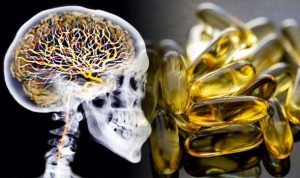Menopause is the natural end of menstration, when the levels of circulating oestrogen and progesterone drastically decrease to end the period of fertility . In the menopausal transition, which can last months or years, there can be a number of symptoms such as hot flushes, irregular periods, vaginal dryness, night sweats and mood changes that are experienced. Due to the fluctuation in hormone levels, menopause is associated with the onset of osteoporosis and cardiovascular disease, therefore diet plays an important role in maintaining health during and after this change.
. In the menopausal transition, which can last months or years, there can be a number of symptoms such as hot flushes, irregular periods, vaginal dryness, night sweats and mood changes that are experienced. Due to the fluctuation in hormone levels, menopause is associated with the onset of osteoporosis and cardiovascular disease, therefore diet plays an important role in maintaining health during and after this change.
Calcium, vitamins D3 & K2
Hormone fluctuation at this time can have an impact on bone density and strength, therefore increasing risk of osteoporosis.
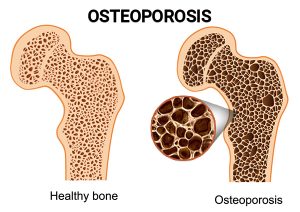 The most effective way to maintain this is consuming calcium, alongside vitamins D3 and K2, as this promotes calcium absorption and transport to the bone. Dietary sources of vitamin K2 and calcium are dairy products, green leafy vegetables, organ meats and fermented foods, whereas vitamin D3 is primarily created when skin is exposed to sunlight. Supplementation of vitamin D is always recommended in autumn and winter months, to ensure optimum levels are maintained.
The most effective way to maintain this is consuming calcium, alongside vitamins D3 and K2, as this promotes calcium absorption and transport to the bone. Dietary sources of vitamin K2 and calcium are dairy products, green leafy vegetables, organ meats and fermented foods, whereas vitamin D3 is primarily created when skin is exposed to sunlight. Supplementation of vitamin D is always recommended in autumn and winter months, to ensure optimum levels are maintained.
Zinc
Zinc plays an essential role in many pathways, particularly the immune system and wound healing. 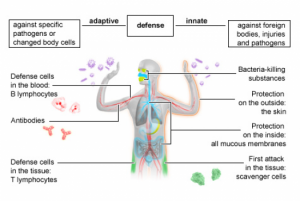
Oysters contain more zinc per serving than any other food, but it can also be found in other shellfish, beef, pumpkin seeds or supplement form.
Potassium
Maintaining a good potassium level is important for heart health and fluid balance, to name just a few roles. 
During menopause plasma potassium levels can drop, therefore it is wise to consume this mineral that can be found in a wide range of dietary sources
including dried fruit, pulses and bananas.
Antioxidant vitamins
These are vitamins A, C and E, which support the body by fighting against oxidative stress benefiting heart and skin health. 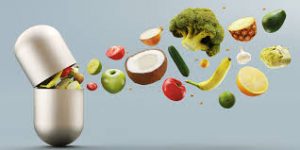
For these nutrients you will be looking for brightly coloured fruits and vegetables including carrots, citrus fruits, peppers and avocado.
Omega 3
Omega 3 fatty acids are essential for a healthy brain and heart, but they also act as an anti-inflammatory, supporting the gut.
These can be found in oily fish, nuts and seeds, however nuts and seeds contain a form that requires conversion to the most active form for our body, meaning the animal sources are far more bioavailable. You can also find omega-3 supplements sourced from either fish or algae.
Probiotics
A healthy gut is key to almost all aspects of health, not least because your gut microbiome supports the absorption of nutrients from your food.
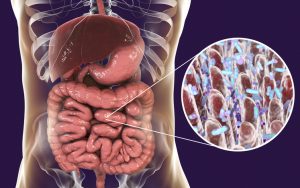
Intestinal microbiome, anatomy of human digestive system and close-up view of intestinal villi with enteric bacteria, 3D illustration
Probiotics (also known as friendly bacteria) can be found in fermented foods, such as sauerkraut, kimchi, kefir and Greek yoghurt, but some may find it more beneficial to supplement as it’s easier to maintain sufficient regular consumption of these friendly bacteria.

